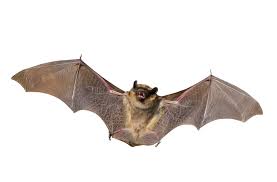bat
英 [bæt]
美 [bæt]
- n. 蝙蝠;球棒;球拍;批处理文件的扩展名
- vt. 用球棒击球;击球率达…
- vi. 轮到击球;用球棒击球
- n. (Bat)人名;(蒙、英)巴特
使用频率:

记忆方法
将“bat”与“ bat-like”的动物形象联系在一起,比如想象一只蝙蝠在空中飞舞,形成动态的图像,这样可以帮助记忆“bat”这个单词的含义,即蝙蝠。
以上内容由AI生成, 仅供参考和借鉴
中文词源
bat 棍子,蝙蝠
1.棍子,词源同beat, 击,打。
2.蝙蝠,词源不详,可能来自拟声词,模仿蝙蝠扇动翅膀的声音。
英语词源
- bat
-
bat: Bat as in ‘cricket bat’ [OE] and bat the animal [16] come from entirely different sources. Bat the wooden implement first appears in late Old English as batt ‘cudgel’, but it is not clear where it ultimately came from. Some have postulated a Celtic source, citing Gaulish andabata ‘gladiator’, which may be related to English battle and Russian bat ‘cudgel’, but whatever the word’s origins, it seems likely that at some point it was influenced by Old French batte, from battre ‘beat’.
The flying bat is an alteration of Middle English backe, which was borrowed from a Scandinavian language. The word is represented in Old Swedish natbakka ‘night bat’, and appears to be an alteration of an earlier -blaka, as in Old Norse lethrblaka, literally ‘leatherflapper’. If this is so, bat would mean etymologically ‘flapper’, which would be of a piece with other names for the animal, particularly German fledermaus ‘fluttermouse’ and English flittermouse, which remained a dialectal word for ‘bat’ into the 20th century.
It is unusual for the name of such a common animal not to go right back to Old English; in this case the Old English word was hrēremūs, which survived dialectally into the 20th century as rearmouse.
=> battle - bat (n.1)
- "a stick, a club," Old English *batt "cudgel," perhaps from Celtic (compare Irish and Gaelic bat, bata "staff, cudgel"), influenced by Old French batte, from Late Latin battre "beat;" all from PIE root *bhat- "to strike." Also "a lump, piece" (mid-14c.), as in brickbat. As a kind of paddle used to play cricket, it is attested from 1706.
Phrase right off the bat is 1888, also hot from the bat (1888), probably a baseball metaphor, but cricket is possible as a source; there is an early citation from Australia (in an article about slang): "Well, it is a vice you'd better get rid of then. Refined conversation is a mark of culture. Let me hear that kid use slang again, and I'll give it to him right off the bat. I'll wipe up the floor with him. I'll ---" ["The Australian Journal," November 1888]. - bat (n.2)
- flying mammal (order Chiroptera), 1570s, a dialectal alteration of Middle English bakke (early 14c.), which is probably related to Old Swedish natbakka, Old Danish nathbakkæ "night bat," and Old Norse leðrblaka "leather flapper" (for connections outside Germanic, see flagellum). If so, the original sense of the animal name likely was "flapper." The shift from -k- to -t- may have come through confusion of bakke with Latin blatta "moth, nocturnal insect."
Old English word for the animal was hreremus, from hreran "to shake" (see rare (adj.2)), and rattle-mouse is attested from late 16c., an old dialectal word for "bat." Flitter-mouse (1540s) is occasionally used in English (variants flinder-mouse, flicker-mouse) in imitation of German fledermaus "bat," from Old High German fledaron "to flutter."
As a contemptuous term for an old woman, perhaps a suggestion of witchcraft (compare fly-by-night), or from bat as "prostitute who plies her trade by night" [Farmer, who calls it "old slang" and finds French equivalent "night swallow" (hirondelle de nuit) "more poetic"]. - bat (v.1)
- "to move the eyelids," 1847, American English, from earlier sense of "flutter as a hawk" (1610s), a variant of bate (v.2) on the notion of fluttering wings. Related: Batted; batting.
- bat (v.2)
- "to hit with a bat," mid-15c.,
权威例句
- 1. Australia, put in to bat, made a cautious start.
- 轮到澳大利亚队出场击球,他们开始打得很谨慎。
- 2. I had bolted the door the instant I had seen the bat.
- 我一看到蝙蝠就把门闩上了。
- 3. He maliciously damaged a car with a baseball bat.
- 他用棒球棒恶意损毁了一辆汽车。
- 4. I picked up his baseball bat and swung at the man's head.
- 我捡起他的棒球棒朝那个人的头打去。
- 5. That silly old bat. I ask you, who'd she think she was?
- 那个老蠢货。我倒要问一问,她以为她是谁呀?